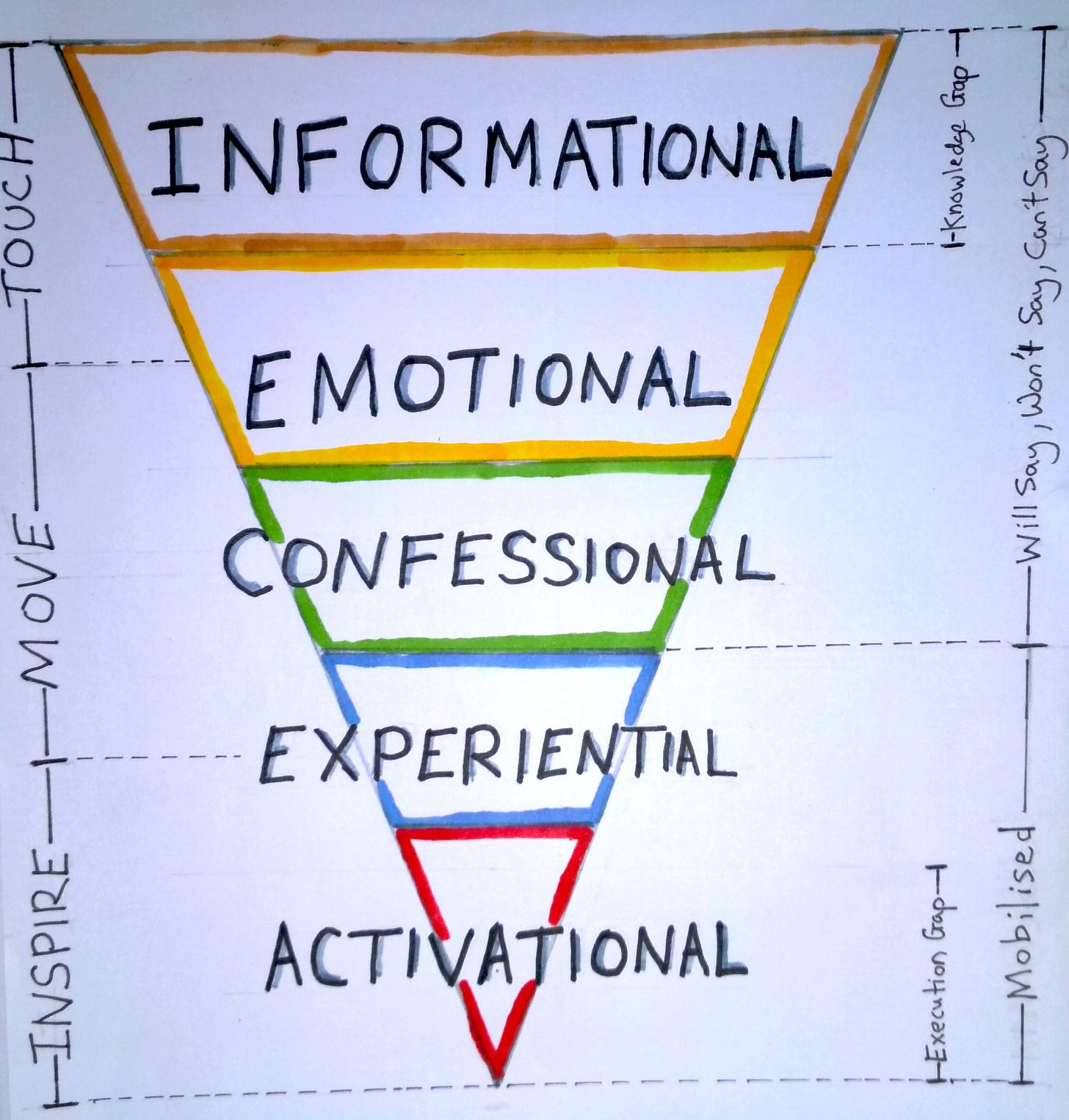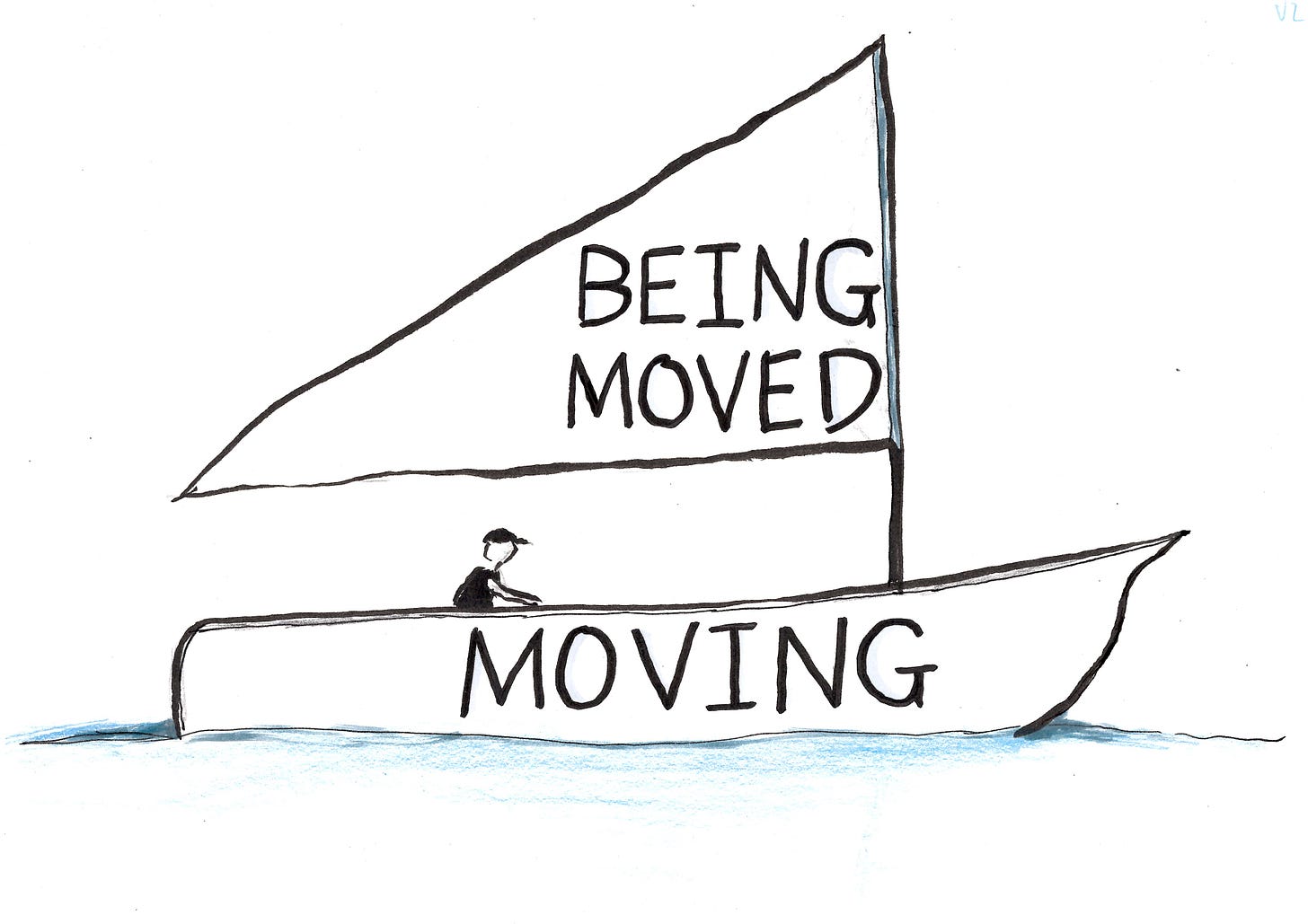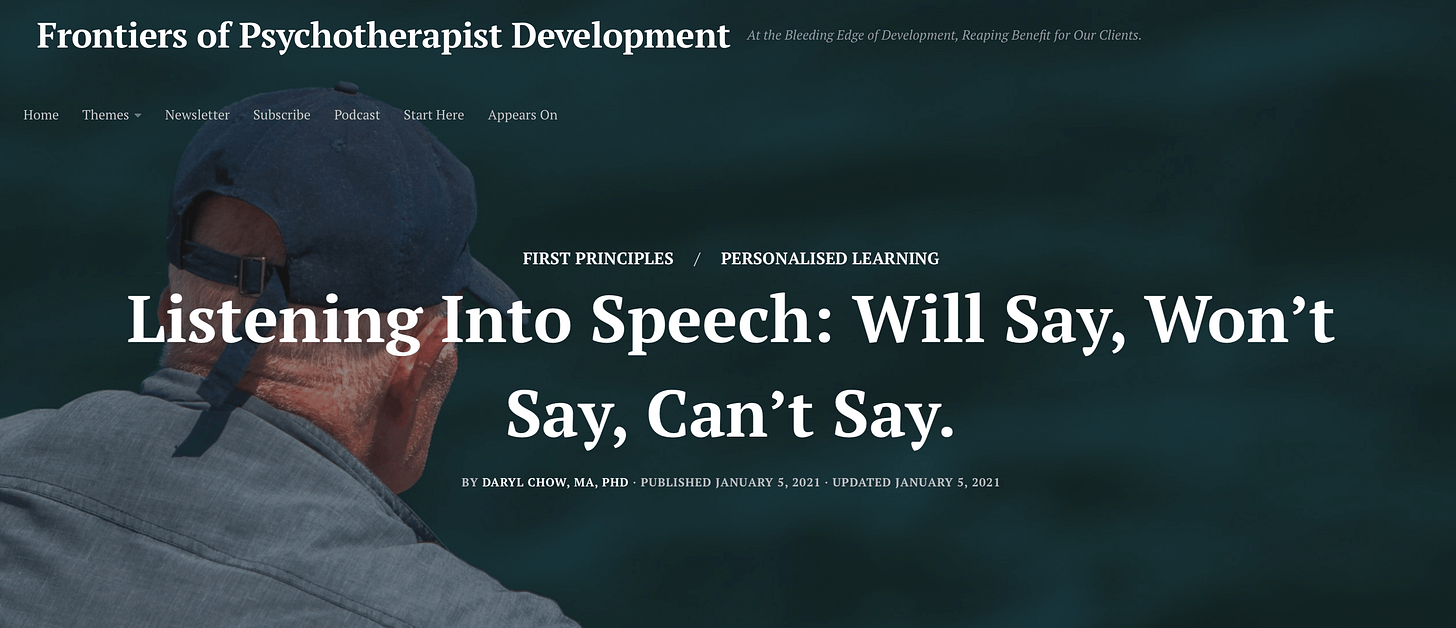We Are Hungry for Depth
We yearn not just for deeper conversations, but deeper connections. Connections that make us come alive.
People are hungry for depth.
We yearn not just for deeper conversations, but deeper connections.
Connections that make us come alive.
Yet, we somehow do not go there very often.
Why is that? Is it too difficult to have a good conversation? Is depth always necessary for a deeper connection to take place?
In order to answer these questions, let's look at the different levels of conversation that take place.
1. Informational
Much of our conversations take place at an informational level.
Information can come in the form of facts ("Ciao Italia is on the corner of South St and Mill Point Rd"), personal opinion ("I love the vegetarian pizza there"), or personal experience ("Do not park on the other side of the road, because the ticket wardens are on a vengeance there.”).
There is nothing wrong connecting with each other at an information level.
These are the things we find easy to say to each other.
At the Informational level, we close the information gap.
RELATED:
Information is Not Transformation
2. Emotional
At the second level of communication, we find ourselves moving beyond the logical and rational level, delving beneath the surface.
At the informational level, head speaks to head.
At the Emotional level, heart speaks to heart.
Something is "moving" within each person and in the space between both parties.
Something is also "being moved," as if the conversation is taking you somewhere you haven’t expected.
Researchers in human emotions offer a fascinating insight. A review article by Janis Zickfeld and colleagues suggested that being ‘moved’ should be treated as a “distinct emotion.”1 Sensations of being moved include tears, chills, a lump in the throat, goosebumps, and warmth in the chest. When seen in this light, it’s easy to understand why the experience of being moved is often considered a passive one, i.e., not something we can actively control. Let me do my Chinese teacher proud and point out that in Mandarin, “being moved,” Gǎn Dòng [感动], literally translates as “to feel movement.”2
In other words, you feel a visceral reaction in your body that is transporting you to another place.
In conversation, we can invite each other to move towards a deeper conversation, as well as open ourselves to be moved by the other. But a quality of spaciousness is needed. You cannot rush into it. And you have to have a level of distress tolerance for strong and complex feelings.
Writer, teacher and activist Parker Palmer provides a useful analogy to think about how we can approach with a form of deep listening:
If we want to see a wild animal, we know that the last thing we should do is go crashing through the woods yelling for it to come out. But if we will walk quietly into the woods, sit patiently at the base of a tree, breathe with the earth, and fade into our surroundings, the wild creature we seek might put in an appearance. We may see it only briefly and only out of the corner of an eye – but the sight is a gift we will always treasure as an end in itself.
Unfortunately, …[we] go crashing through the woods together, scaring the soul away. In spaces ranging from congregations to classrooms, we preach and teach, assert and argue, claim and proclaim, admonish and advise, and generally behave in ways that drive everything original and wild into hiding. Under these conditions, the intellect, emotions, will and ego may emerge, but not the soul: we scare off all the soulful things, like respectful relationships, goodwill, and hope.3
And if you wonder about how to have conversations at an Emotional level, it takes the leap from one to open up. What can you do? Be vulnerable first.
Social psychology experiments demonstrate that when you open up about yourself first, the other party is more likely to warm up to you, and they are more likely to reveal themselves to you.4
Trust can only come from relational risk-taking.
At the Emotional level of conversation, let the conversation move you. Do not try to be cognitive or factual. You are now in the soul territory.
If you prematurely attempt to smack a dose of logic into the mix, you'd be unpleasantly surprised by the negative reaction of the other person.
3. Confessional
Moving beyond the Informational and Emotional stages, when the timing and place is right—and when there is a level of trust with the specific individual—we are drawn to reveal the unspokens.
To confess, is to open up what is hidden in plain sight.
To confess, is to unshame.
Shame has its way of making us retreat deeper into the cave.
But shame is an innocent emotion.
Think of a child who is "ashamed." He instinctively curls up like a ball and wants to cover his face. Further chastising would only make the child want to retreat further. Instead, a child who is experiencing shame (i.e., feeling like they not only have done something wrong, but feeling as if he is something wrong), just needs to be held. Lessons to be learned can take place later.
At any given point in time, we live in two worlds: the inner and the outer life. To confess, is to invite the other into one's inner-world.
Will you judge me?
Will you think less of me?
Will you still love me?
When someone fesses up to something to you, a shameful event, a long-held secret, know that you are no longer in the Information or even Emotional levels.
At the Informational level, we say what we “Will Say.”
At the Emotional level, we say what we “Won’t Say.”
At the Confessional level, we say what we “Can’t Say.”
SEE RELATED:
True connection doesn’t arise from sharing of our strengths alone. We call that boasting. Perhaps this is why the attempts of tech companies to foster "connection" through social media platforms fail dismally. The loneliness epidemic continues, while we amuse ourselves to death in the pits of the infinite scroll.
We only truly connect in our weaknesses, not strengths.
At the Confessional level, there is nothing to fix, to solve, or to do.
Just receive, whole-heartedly.
RELATED:
PostSecret is an ongoing community mail art project, created by Frank Warren in 2004, in which people mail their secrets anonymously on a homemade postcard. Selected secrets are then posted on the PostSecret website, or used for PostSecret's books or museum exhibits.
4. Experiential
We are not looking for a new explanation. We are looking for a new experience.5
At the fourth level of communication, we are experiencing something new on the inside. It is quite possible to have new experiences on the outside, and nothing changes on the inside.
You can talk till the cows come home at an Informational level, and nothing’s changed.
Experiential experiences have a significant impact. This can occur in a variety of settings e.g., watching a movie, listening to music, a nature trail walk.
Experiential experiences can also occur in conversation. And they are a mobilising type of conversation.
Think about how you feel when you are talking to someone who doesn't listen to a word you are saying, and is steam-rolling on what a great holiday they have had in the Bahamas. You end up feeling small. The person is quite likely to continue the conversation even when you are replaced with a wall.
Now think about how you feel when you are in conversation with someone who cares about you. You are likely to experience an entirely different quality, one that is life-expanding.
You even like yourself better when you are in the presence of this caring individual. At the Experiential level, you are moved more than you would be at an Emotional level. You are experiencing you at a deeper level.
At the experiential level of communication, there is a chance that you are inspired to become a better version of yourself.
RELATED:
Watch the teacher, Jane Elliot facilitate an experiential exercise on discrimination:
5. Activational
At the fifth level of communication, we feel an impulse to take action.
When I am by myself, I feel less inclined to make music. But after a late night chat with some musician friends, I feel inspired to pick up an instrument. (And with some other friends, if I'm not careful, I start to develop G.A.S., a term that musicians use to describe gear acquisition syndrome, i.e., a lust to buy more music gear).
Beyond the Experiential level, something in you is now activated. You want to convert what you feel on the inside and do something about it on the outside.
Caution: When someone is talking to you at a Confessional or Emotional level, and you are responding in an Activational level, you'd find a mismatch.
For example, if you friend reaches out to you and wants to chat about her relationship struggle and her conflicted feelings about this guy she has been with for a few years, but you go into advice-giving mode, “I think you should just leave that asshole,” your friend is likely to look at you as if "you don't get it."
Or, she might respond with, "Yeah... but," statements. Or, if there are polite, they might say, "Hmm..." She needs to process her thoughts and not take action just yet.
At the Activational level, we feel the rise in our body to hit the ground running and spring into action. Here, we close the execution gap.
Woundings
We wound each other when we are not speaking at the same level.
An adult child who continually attempts to connect to an emotionally stunned parent beyond the Informational level gets wounded further, simply because the parent does not know how to. Any emotional content sends this parent into an auto-pilot flee-mode. That parent never experienced closeness from their parents.
On the flipside, a parent who keeps trying to “teach” a child to do the right thing (i.e., Activational level), but does not have any deep connection with the child (i.e., Emotional, Confessional, and Experiential levels), will end up bewildered and frustrated. “My child is so stubborn. She never listens.”
With couples, we end up attacking each other in the heat of arguments when we fail to be gentle with each others vulnerabilities, our “Will Says, Won’t Says, and Can’t Says.”
For example, your spouse keeps complaining that you work too much (will say), and you get upset because you are diligently working your ass off, for fear of losing your job in the next round of redundancy. But actually, your spouse is missing your presence at home (won’t say). And deeper under the hood, she is actually feeling insecure about your absence, and wondering if you no longer find her attractive since the birth of the child (can’t say).
The late Buddhist teacher Thich Nhat Hanh said in his book How to Love,
Understanding is love’s other name. If you don’t understand, you can’t love.
To love without knowing how to love wounds the person we love.
We hurt each other when we fail to understand each other.
And understanding requires not just communication, but spacious, deep conversations.
More, not only do we need to seek to understand, but also help the other feel understood.
That can be difficult to do, especially with the ones we live with, the ones we are close to, and the ones we know for a long time.
Seek to understand and help the other feel understood, and not trying to change them.
RELATED:
Reflect:
How have we been wounded by the ones we love?
A deeper reckoning: how have we wounded the ones we love?
Who is someone that you would like to have a deeper conversation with?
Thank you for reading Full Circles: Meditations on the Inner and Outer Life. If you are new here, learn about me, and the About Page.
These posts are meant to be what Lewis Hyde describes as a “Gift.” What this “Gift” concept means for me is that
Nothing is expected out of you.
I hope you receive it.
I hope this animates and transforms you.
I hope you spread the love to others.
Daryl Chow Ph.D. is the author of The First Kiss, co-author of Better Results, and The Write to Recovery, Creating Impact, and The Field Guide to Better Results. A forthcoming book Crossing Between Worlds: Moving and Being Moved Through the Transitions of Life is slated to be released this season.
If you are a helping professional, you might like my other Substack, Frontiers of Psychotherapist Development (FPD).
Janis H. Zickfeld, Thomas W. Schubert, Beate Seibt, & Alan P. Fiske. (2019). Moving Through the Literature: What Is the Emotion Often Denoted Being Moved?: Emotion Review, 1–17. https://doi.org/10.1177_1754073918820126
I failed at Chinese at my GCE O Levels exams, twice. I couldn't read 80% of the text, so I did my Chinese oral exams in English, much to the amazement of my classmates.
A Hidden Wholeness: The Journey Toward an Undivided Life, by Parker Palmer.
Youngme Moon (2000) devised an interesting social experi- ment on how consumers self-disclose personal information to a computer. She discovered that participants were more likely to share vulnerable, personal information, when the computer revealed itself. For example, instead of the computer asking the question, “What have you done in your life that you feel most guilty about?” the computer “opened up” first: “This computer is usually used on a daily basis by many different users. Sometimes, however, many days go by without anyone using it at all. This usually happens over the holidays. So this computer ends up just sitting here, for days and days, with absolutely nothing to do,” and then the question is asked. The participants knew that this was a computer, not a person. And they rated the computer that they’ve interacted with as more likeable, friendly, kind, and helpful!
Moon, Y. (2000). Intimate Exchanges: Using Computers to Elicit Self-Disclosure from Consumers. Journal of Consumer Research, 26(4), 323-339.
The original quote is from psychoanalyst Frida Fromm-Reichmann, "The patient does not need an interpretation, but a new experience.”








Brilliant stuff DC. I love the way you distil things to their essence. I might have to start calling you Daryl the Distiller!
This strikes a chord with me too.
Dare to take risks in order to deepen relationships with other people.
I also think the article captures the complexity of fostering deeper conversations in couples therapy.
Thanks Daryl!
Bengt